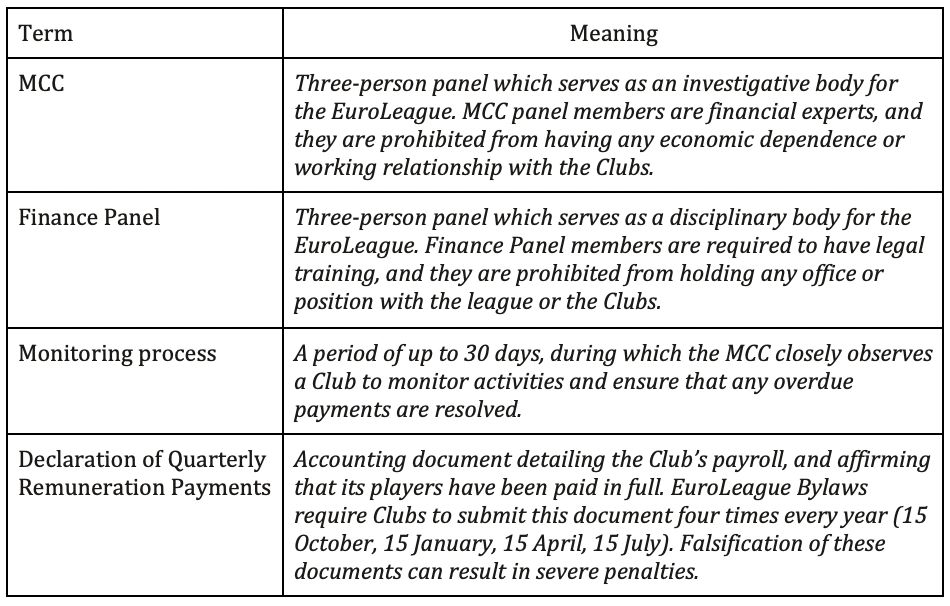The EuroLeague Framework Agreement (EFA) establishes stringent protocols to ensure players receive contractually-guaranteed compensation in a timely manner. Both the ELPA and the EuroLeague agree that paying players on time is essential to improving the league’s long-term stability and financial health. With this in mind, the EFA sets up a structure of rules and procedures to ensure that players are paid for their work, and also to sanction Clubs in case they fail to abide by the contract payment schedule.
This article explains the investigatory and disciplinary mechanisms that govern overdue salary payments, including rules, deadlines, unilateral termination, the roles of the MCC and Finance Panel, and more.
Definitions

Payment Schedule Rules:
According to the EFA, Clubs are required to pay all their players on time, according to the payment schedule agreed upon in the contract. Clubs are not allowed to unilaterally deviate from the terms of the contract for any reason, and unilateral adjustments to the agreed-upon payment schedule are prohibited.
Both the ELPA and the EuroLeague recognize that some Clubs may have limited cashflow early in the season. In order to address this issue and provide Clubs with some flexibility, the EFA allows for up to 30% of a Player’s annual remuneration to be backloaded into the final two equal monthly payments–however, this must be agreed upon with the Player when signing the contract, and explicitly written into Article 5 of the SPC.
Following these rules is the best way to ensure that the EuroLeague disciplinary bodies (MCC & Finance Panel) do not need to get involved. However, if a payment does become overdue, the EFA has set up certain steps and procedures to correct the issue and prevent it from happening again.
Step 1: Initiating the Monitoring Process
When a Club violates its contractual obligations, it may become subject to a monitoring process by the MCC. The monitoring process can be initiated in four different ways.
The MCC will initiate the monitoring process at the request of ELPA, on behalf of a Player, if:
- The Player’s remuneration payment is overdue by over 15 days.
- The Club fails to pay the player his total gross remuneration for the season by 15 July.
The MCC will initiate the monitoring process against a Club automatically, if:
- The Club fails to submit their Quarterly Declaration of Remuneration Payments on time.
- The Club’s Declaration reveals that one or more payments is 15+ days overdue.
The monitoring process will last either 30 days, or until the payment becomes 45 days overdue, whichever sooner (i.e. if the payment is 25 days overdue when the process is initiated, the monitoring period will last 20 days).
Step 2: Referral to the Finance Panel
If the overdue payment is not resolved during the monitoring process, the MCC then refers the case to the Finance Panel.
However, if the MCC discovers a payment that is already overdue by 45 days or more, the monitoring process is skipped, and the case is referred to the Finance Panel without further delay.
Once a case has been referred to the Finance Panel, a temporary ban on the registration of new players and coaches is immediately imposed on the Club. This is a swift disciplinary measure, intended to incentivize Clubs to resolve overdue payments quickly. It also serves as a temporary penalty while the Finance Panel considers any potential further steps.
Next, the Finance Panel will consider the facts of the case, and issue a decision on the case within 20 days (this deadline may be extended by 15 days under exceptional circumstances).
Step 3: Decision of the Finance Panel
The Finance Panel has the power to issue disciplinary sanctions towards the Club. The type of sanction issued will be determined by the Finance Panel, according to the severity of the infraction, as well as other potential aggravating factors, including recidivism.
According to the EuroLeague Bylaws, the types of sanctions issued by the Finance Panel may include:
- Warnings
- Fines
- Forcing clubs to play games behind closed doors
- Temporary closure of their arena
- Temporary loss of economic rights (right to receive economic distribution for their participation in EuroLeague competition)
- Temporary loss of political rights (right to participate and/or vote in EuroLeague governing bodies)
- Permanent or temporary disqualification from EuroLeague competition
- Ban on registering new players and coaches
If the Finance Panel delivers a decision confirming the overdue payables, they will also give the Club a final deadline of 10 days to settle the amount.
The disciplinary power of the Finance Panel is intended as a preventative measure–the prospect of sanctions is meant to dissuade Clubs from allowing cases of overdue payments to continue. However, once a case has reached the Finance Panel, the sanctions also serve to penalize the Club for the violation and discourage recidivism.
Step 4: Unilateral Termination
As a final measure, if a player’s salary payment becomes overdue by 60 days or more, the EFA allows him to unilaterally terminate his contract. Club and player may agree on a shorter timeline for a player to terminate unilaterally in case of overdue payables.
In case of termination under these circumstances, the player is no longer obliged to perform any work for the Club, and is free to sign with another Club if he so chooses.
Conclusion
These rules and structures help to protect the financial stability of the EuroLeague and the integrity of the player contract. By prioritizing fair working standards for players and incentivizing Clubs to honor their contractual commitments, these EFA protections represent significant progress towards improving the Club-Player relationship and solidifying the EuroLeague’s status as the premier basketball competition in Europe. By introducing the rules explained above, the players are not required to terminate their agreements with clubs in order to receive the outstanding salaries. This in-house financial system allows players and clubs to continue with their contractual relationship even in case of late payments (until 60 days), while assuring the players that clubs will be sanctioned in case of non-payment.




